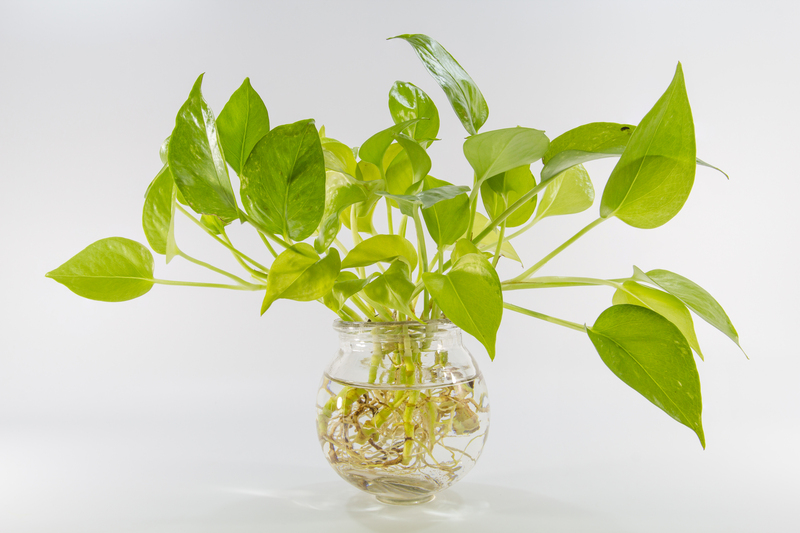Transform Your Garden with These 3 Weed Control Secrets
Posted on 19/08/2025
Transform Your Garden with These 3 Weed Control Secrets
A flourishing garden is every homeowner's dream. But nothing ruins the beauty of your outdoor sanctuary quite like a stubborn invasion of weeds. Are you searching for reliable, long-lasting ways to keep your garden beds pristine and weed-free? Weed control is a common challenge, but with the right approach and expert strategies, you can transform your garden from overrun to outstanding. In this in-depth guide, discover the three proven weed control secrets that professional gardeners use to keep landscapes lush, vibrant, and weed-resistant.
Why Effective Weed Management is Essential for Your Garden
Weeds aren't just an aesthetic nuisance; they also compete with your valued plants for light, water, and essential nutrients. Over time, invasive weeds can stunt the growth of your flowers, shrubs, and vegetables, resulting in disappointing yields and unhealthy plants. An effective weed management system ensures year-round beauty and protects the investment you've made in time, effort, and money.
Implementing the right weed control measures isn't just about removing unwanted growth; it involves a multi-layered approach that includes prevention, physical removal, and maintenance. Let's dive into the top three weed control secrets that'll turn your garden into a weed-free haven.

Secret #1: Mulching - Nature's Barrier Against Weeds
Mulching is a gardener's best friend when it comes to controlling weeds. By acting as a natural barrier, mulch blocks sunlight from reaching weed seeds, preventing them from germinating and taking over your garden beds.
How Mulch Works to Suppress Weeds
- Prevents weed seed germination by cutting off sunlight.
- Retains soil moisture and regulates temperature for healthier plants.
- Adds nutrients to the soil as organic mulch gradually decomposes.
- Reduces erosion and improves soil structure.
Types of Mulch for Optimum Weed Control
There are two main types of mulch to consider for weed prevention:
- Organic Mulch: Includes wood chips, straw, leaves, grass clippings, pine needles, and compost. Not only does organic mulch prevent weeds, but it also enriches the soil.
- Inorganic Mulch: Examples include black plastic, landscaping fabric, and gravel. These provide a long-lasting weed barrier, though they don't improve soil fertility.
Pro Tip: For the best results, apply a layer of mulch that's at least 2-3 inches thick. Be sure to leave space around the stems of your plants to avoid rot and encourage healthy growth.
Maintaining Your Mulch
- Top up your mulch annually to maintain a consistent barrier.
- Watch for any weeds that manage to poke through and remove them promptly.
Mulching is a simple yet powerful step in keeping your garden weed-free year after year.
Secret #2: Smart Planting - Crowd Out Weeds with Strategic Layout
One of the most overlooked weed control strategies is dense and strategic planting. By maximizing the coverage of your garden beds, you leave little room for weeds to establish themselves.
The Power of Dense Planting
- Reduces open soil surface where weeds could take hold.
- Creates competition - healthy, mature plants block sunlight and absorb resources that weeds need.
- Supports a robust ecosystem around your desired plants.
Utilize ground covers, low-growing shrubs, and vigorous perennials to create a living mulch. Not only will your garden look fuller and more lush, but you'll also drastically reduce the emergence of unwanted weeds.
Best Plants for Weed Suppression
- Flowering Groundcovers: Such as Creeping Thyme, Ajuga, and Sweet Woodruff.
- Ornamental Grasses: Including Blue Fescue and Carex.
- Edible Groundcovers: Like Strawberry and Peppermint.
Idea: Interplant vegetables and flowers for a beautiful, functional garden that suppresses weeds naturally.
Row Spacing and Staggering
- Plant crops closer together, following specific plant recommendations.
- Stagger rows and alternate plant heights for an overlapping canopy effect.
- Rotate crops annually to prevent weed adaptation.
Strategic, dense planting is an easy and attractive way to minimize weeds in your garden while maximizing your harvest and curb appeal.
Secret #3: Timely Hand Weeding - Stay Ahead for Lasting Results
Although it requires a bit of sweat equity, hand weeding remains one of the most effective weed removal techniques. If you catch weeds early and remove them regularly, you can prevent them from setting seed and multiplying.
Why Hand Weeding Works
- Removes weeds at their roots to prevent regrowth.
- Allows selective removal without disturbing desired plants.
- Reduces the weed seed bank year after year.
- Prevents weed competition before it can impact plant health.
Best Practices for Effective Hand Weeding
- Weed regularly, especially after rain when the soil is soft.
- Use the right tools; a hand fork, hoe, or even gloved hands can make the job easier.
- Remove the entire root system, especially for persistent weeds like dandelion or bindweed.
- Target young weeds before they flower and set seed.
- Dispose of uprooted weeds away from your garden to avoid recontamination.
Tip: Set aside 15-20 minutes a week for focused hand weeding. Making this a routine will keep weeds from ever becoming overwhelming.
Bonus Tips: Integrated Weed Management for Garden Transformation
Combining these three secrets with additional smart practices can lead to truly transformative weed control:
- Water selectively: Use targeted irrigation like drip hoses to water only your plants, leaving weed seedlings high and dry.
- Use weed barriers: Place landscape fabric beneath mulch in high-risk areas.
- Monitor new plants: Purchase weed-free mulch and compost, and always inspect transplants for hitchhiking weeds.
- Practice crop rotation: Changing plant families each season prevents weeds and soil-borne diseases.
- Encourage a healthy lawn: Maintain proper mowing height and overseeding to outcompete weeds in grassy spaces.
Eco-Friendly Weed Control Solutions
For gardeners seeking organic weed management, try these natural herbicide alternatives:
- Boiling water: Pour directly onto weeds in cracks or walkways.
- Vinegar solution: Mix vinegar, salt, and a few drops of dish soap as a spot treatment (avoid direct contact with desirable plants).
- Manual soil disturbance: Regular hoeing prevents weed seed establishment.
Remember, persistence and a multi-faceted approach are key when battling persistent weeds.

FAQs: Weed Control Techniques for a Thriving Garden
-
How often should I apply mulch for weed control?
Renew your mulch each year, usually in spring or early summer. Spot-treat thin patches as needed. -
What is the best weed control for vegetable gardens?
Combine mulch, strategic planting, and frequent hand weeding for the most effective and food-safe weed barriers. -
Are chemical herbicides safe in home gardens?
Always use with caution, following manufacturer directions. Organic and manual methods are often preferable, especially around edibles and kids. -
Can I control lawn weeds without chemicals?
Yes! Regular mowing, overseeding, and targeted hand removal can create a lush, weed-resistant lawn.
Conclusion: Create a Beautiful, Weed-Free Oasis
You don't have to let weeds dictate the look and health of your landscape. By embracing the three weed control secrets -- mulching, smart planting, and timely hand weeding -- and enhancing them with integrated, eco-friendly techniques, you'll be on your way to a garden that's not only beautiful but robust and thriving. Commit to these steps for lasting results, enjoy more time savoring your garden, and less time battling stubborn weeds!
Ready to transform your garden? Start implementing these savvy weed control tactics today, and witness the difference in your outdoor paradise.
Related Resources:
- University of Minnesota: Weeds in Gardens and Landscapes
- Royal Horticultural Society: Weeds Control Advice
- Gardening Know How: Controlling Garden Weeds
For more tips and inspiration on sustainable gardening and weed control solutions, subscribe to our newsletter and join our community of passionate home gardeners.
Latest Posts
Transform Your Garden with Unique Hedge Shapes
Secrets to Keeping Your Orchids Blooming
Refining Your Garden with Hedge Trimming Techniques

